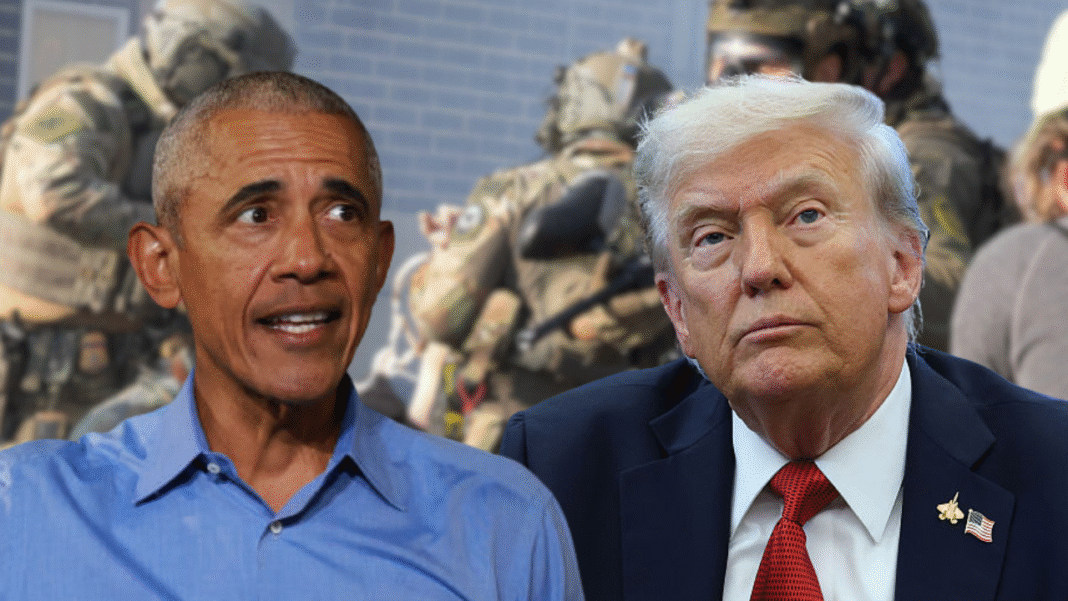Obama’s Critique of Trump: A Call to Defend Democracy
Former President Barack Obama has taken a clear stance against the current administration’s approach to law enforcement, particularly concerning the use of military power in American cities. In a recent episode of the WTF podcast, Obama expressed grave concerns over President Donald Trump’s efforts to deploy military forces domestically, framing it as a troubling trend that intentionally undermines the principles of democracy.
Obama emphasized the dangers inherent in employing the military against civilians, stating, “When you have a military that can direct force against their own people, that is inherently corrupting.” This statement reflects his belief that such actions can lead to a deterioration of trust between the government and the populace, effectively politicizing the military in a manner that could have far-reaching consequences for societal stability.
The Context of Trump’s Military Deployments
Trump’s rationale for the deployment of National Guard troops in cities, particularly those governed by Democratic leaders, has been framed as a necessary response to rising crime rates. The cities affected have included Los Angeles, Washington, D.C., Memphis, Portland, and most recently, Chicago—where Obama has resided for over three decades. By sending military resources into these urban areas, the administration has raised alarms about public safety, positioning itself as a protector against chaos.
However, this strategy has been met with fierce resistance. A federal appeals court recently intervened to block several aspects of these deployments, citing legal precedents and questioning the administration’s justification for military actions in urban settings. While the court allowed the National Guard to maintain a presence, it did not endorse the broader militarization of local police forces, a point Obama passionately criticized.
Legal Precedents and Democratic Norms
One of Obama’s central arguments against the deployment of the military centers around the Posse Comitatus Act. This longstanding federal law restricts the use of military forces for domestic law enforcement unless under extraordinary circumstances. Obama articulated that the Trump administration’s framing of ordinary crime as an insurrection or terrorist threat represents a “deliberate end run” around this law, which has established how democracy should function in America.
In his view, such actions are not merely tactical choices but represent a systematic effort to weaken the foundational structures of American democracy. He stated, “When you see an administration suggest that ordinary street crime is an insurrection…that is a genuine effort to weaken how we have understood democracy.” This redefinition of civic norms, according to Obama, damages the institutional guardrails vital for a functioning democracy.
The Double Standard in Political Discourse
Obama further highlighted what he perceives as a double standard among conservative media and political commentators. He argued that had he taken similar actions during his presidency, the backlash would have been swift and severe. The selective outrage indicates a troubling inconsistency in how political leaders and their actions are scrutinized, prompting Obama to question the integrity of the narrative surrounding these deployments.
This perception of bias extends to discussions of leadership, with Obama asserting that such actions fundamentally harm the nation. By framing Trump’s military deployments as authoritarian moves, he aligns them with tactics used by repressive regimes, urging citizens to recognize and resist such encroachments on their liberties.
The Call to Action from Local Leadership
Local leaders have echoed Obama’s sentiments, particularly Chicago Mayor Brandon Johnson, who recently stated that Trump has “declared war on the city of Chicago.” In an interview, Johnson characterized such militaristic tactics as remiss of democratic values, warning that this represents a playbook characteristic of authoritarian regimes. He called for citizens across the nation to “push back fiercely” against what he identified as tyrannical governance.
Johnson’s feistiness reflects a larger resistance among city officials and community leaders, emphasizing the need for vigilance and advocacy to protect democratic norms. As urban areas across the country grapple with issues of crime, public safety, and civil rights, the conversations around military presence in civilian spaces are transforming into broader dialogues about the future of democracy itself.
The Broader Implications
Through these discussions, Obama has highlighted the fragility of the democratic norms that many once took for granted. He pointed out that while the core institutions of democracy may not be destroyed, they have sustained significant damage. The systematic challenges posed by the current administration, he warns, threaten to dilute the very essence of American values and governance.
In today’s political climate, each deployment and measure taken in the name of order and security raises critical questions about governance, accountability, and the responsibilities of leadership. The ongoing discourse invites citizens to engage actively with their democratic rights and responsibilities, reinforcing the need for awareness in defending democracy against potential overreach.



